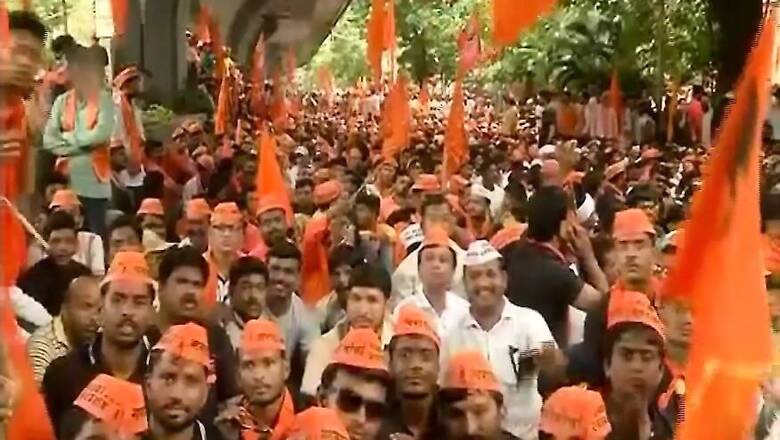
views
It has not come as a bolt from the blue. But it is a fact that Maharashtra Chief Minister Devendra Fadnavis and the BJP are facing the first serious crisis with agitation by Marathas, demanding reservation in government jobs and education, turning violent ahead of the Lok Sabha elections.
Although Marathwada region seems to have become an epicentre of the agitation, it is spreading to other parts of the state as well. The agitation has been going on for long but in a silent manner and therefore a sense of complacency had apparently taken over the ruling establishment.
Now the administration, led by Fadnavis, a Brahmin, faces a ticklish task. It has to address on a war footing the issue in totality without disturbing the social balance. This is because agitators, especially youth, are getting restless as they seek employment. The landholdings in traditional agrarian communities like Marathas are shrinking and farming is no more a sustainable proposition. The matter has turned more complex as the issue is at present pending with the court.
Fadnavis is not alone to be blamed. Successive governments over the last two decades have adopted delaying tactics. This has put major political parties in the dock.
The agrarian discontent in Maharashtra has been simmering for over a decade now. A spate of farmers’ suicide and growing restlessness of jobless youth is a manifestation of that. Social tensions are getting sharper and migration to urban centres is increasing.
The problem is further compounded by the fact that the state has been lacking a “leader" who has a vision and an appeal cutting across caste, community and regional considerations.
“Devendra Fadnavis should call agitating leaders for talks on this issue immediately, hold an all-party meeting to find out a solution to how reservation could be implemented without waiting for the judicial pronouncement," said a former chief minister of Maharashtra.
Although no political party in Maharashtra is opposing reservation to Marathas. The community is politically vocal and numerically strong.
“Somebody has to take the call," says another leader in the party. Asked if it will pacify the agitators, solve the problem, he said it could satisfy the agitators but court and legislature alone could only resolve the issue.
MPs, cutting across party lines, admit privately that reservations are a complex issue which political parties find politically sensitive to handle. The matter is pending before the court, a commission of inquiry has been set up.
But there are others who feel that the aggressive stand by the Marathas for reservation could lead to the isolation of the community, or an anti-Maratha political mobilisation.
Maharashtra is changing fast. Despite being hailed as one of the most progressive and developed states, it is witnessing huge fallout of lop-sided progress.
The demand for reservation by the dominant Marathas is indicative of the plight of sections of various communities that have lagged behind in urbanisation of the society.
The fault lines are being witnessed at a time when the Dalits and OBCs are not happy over the Marathas’ demand for reservation fearing that it might lead to encroachment of their rights.
Silent marches taken out by the Marathas all over the state, which had witnessed massive participation including of leaders of various hues, has also alarmed ‘others’, including Dalits and OBCs, about the intentions of the dominant community.
The Maratha reservation movement taking an anti-Fadnavis turn surprised many. The community leaders singling out the CM has a political undertone in a state where the Congress has relied on Maratha, Muslim and Mahar mobilisation to rule for more than five decades in the state. The BJP on the other hand has build a coalition of various OBC communities to challenge the Congress hegemony.
Manohar Joshi of Shiv Sena was the last Brahmin CM of the state- the community constitutes less than three percent of the state electorate.
With 48 Lok Sabha seats, Maharashtra is politically the second most important state after Uttar Pradesh. Talk is that the BJP planned to have Assembly elections in Maharashtra along with the Lok Sabha polls scheduled by May next year. The Maratha agitation as it comes just ahead of the general elections thus is the biggest challenge for CM Fadnavis.




















Comments
0 comment